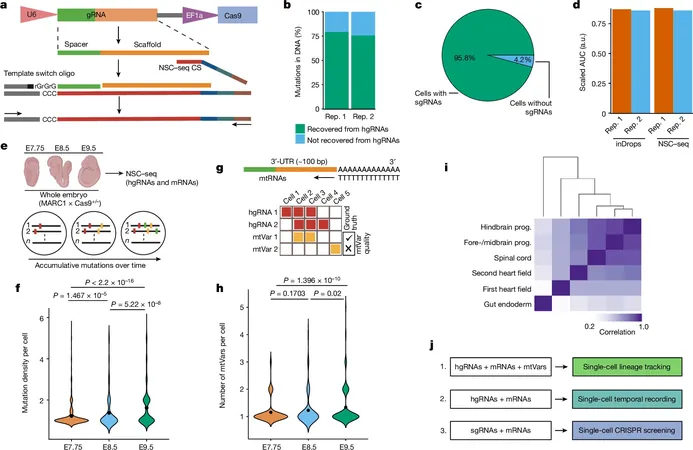
Unlocking the Secrets of Cancer: How Timing of Cellular Growth Might Hold the Key!
2024-10-30
Author: Jia
Introduction
Cancer remains one of the most formidable challenges in modern medicine, characterized by the unchecked growth of abnormal cells. While numerous types of cancer are treatable or even curable, the precise origins of many remain shrouded in mystery. Recent groundbreaking research from Vanderbilt University, spearheaded by graduate student Mirazul Islam under the guidance of Professors Ken Lau and Robert Coffey, reveals that understanding the timing of cellular events is crucial in unraveling the complex pathways that lead to cancer development.
Key Findings
In a stunning revelation, the researchers found that colorectal cancer does not evolve from a single aberrant cell. Instead, it appears to arise from multiple normal cells within the intestinal epithelium. This paradigm shift challenges long-held assumptions about cancer genesis and could pave the way for innovative strategies for treatment and diagnosis.
Molecular Clock Technology
The pivotal findings, which were published in the prestigious journal Nature, highlight the importance of harnessing a “molecular clock” that captures the timing of cellular events at an individual cell level. This technology provides a window into the dynamic process of how normal cells transition into precancerous and ultimately cancerous states.
Current Methodologies
Current methodologies to predict cancer progression primarily focus on the size of polyps—small clusters of cells that can morph into malignancies. However, research shows that only a small proportion of precancerous lesions progress to full-blown cancer. The breakthrough presented by the Vanderbilt team offers a more nuanced understanding: by employing a CRISPR-based genetic barcoding method, they have created a precise system to log when these cellular events occur in real time.
Broader Implications
In addition to cancer research, the implications of this study extend to the fields of developmental biology and tissue regeneration. Lau expressed optimism about the potential of this approach to illuminate the dynamics of cell populations, particularly in regeneration, by identifying novel stem cell-like cells.
Research Methodology
Utilizing an extensive database from the Vanderbilt University Medical Center and the Human Tumor Atlas Network, the researchers compiled one of the largest multi-omic atlases of human sporadic polyps. Their analysis revealed that colorectal cancer likely emerges from distinct mutational events occurring across several healthy cells, challenging the past view of cancer as originating predominantly from a single aberrant cell.
Future Directions
The team also posited that cancer transitions from a stage where multiple genetically diverse cells coexist (polyclonal) to a phase where a single genetically identical cell dominates (monoclonal). This critical understanding can drive the development of more robust predictors for cancer progression, potentially transforming clinical practices.
Conclusion
"As Mirazul drove this entire project from conception to execution, his efforts underscore the collaborative spirit needed in cutting-edge research,” said Coffey, recognizing the vital contributions of their collaborators.
With cancer rates steadily increasing worldwide, research like this is not only timely but pivotal in shifting the narrative on diagnosis and treatment. Keep your eye on Vanderbilt University as they continue to explore the intricate world of cellular dynamics – their findings may well hold the key to the future of cancer therapy!



 Brasil (PT)
Brasil (PT)
 Canada (EN)
Canada (EN)
 Chile (ES)
Chile (ES)
 Česko (CS)
Česko (CS)
 대한민국 (KO)
대한민국 (KO)
 España (ES)
España (ES)
 France (FR)
France (FR)
 Hong Kong (EN)
Hong Kong (EN)
 Italia (IT)
Italia (IT)
 日本 (JA)
日本 (JA)
 Magyarország (HU)
Magyarország (HU)
 Norge (NO)
Norge (NO)
 Polska (PL)
Polska (PL)
 Schweiz (DE)
Schweiz (DE)
 Singapore (EN)
Singapore (EN)
 Sverige (SV)
Sverige (SV)
 Suomi (FI)
Suomi (FI)
 Türkiye (TR)
Türkiye (TR)
 الإمارات العربية المتحدة (AR)
الإمارات العربية المتحدة (AR)